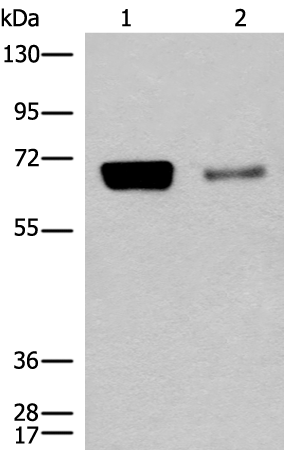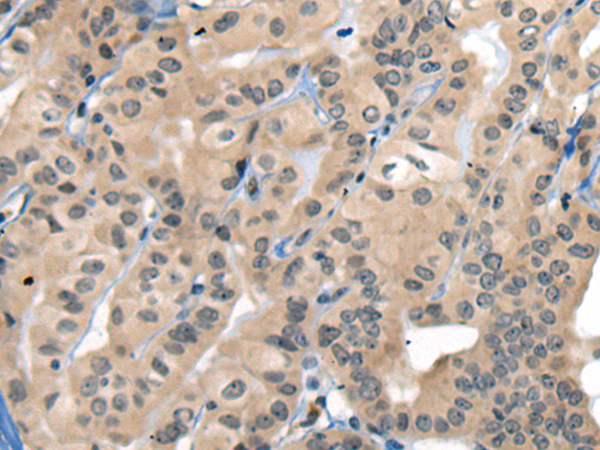

| WB | 咨询技术 | Human,Mouse,Rat |
| IF | 咨询技术 | Human,Mouse,Rat |
| IHC | 1/20-1/100 | Human,Mouse,Rat |
| ICC | 技术咨询 | Human,Mouse,Rat |
| FCM | 咨询技术 | Human,Mouse,Rat |
| Elisa | 1/5000-1/10000 | Human,Mouse,Rat |
| Aliases | RCOR; COREST |
| WB Predicted band size | 53 kDa |
| Host/Isotype | Rabbit IgG |
| Antibody Type | Primary antibody |
| Storage | Store at 4°C short term. Aliquot and store at -20°C long term. Avoid freeze/thaw cycles. |
| Species Reactivity | Human, Mouse |
| Immunogen | Synthetic peptide of human RCOR1 |
| Formulation | Purified antibody in PBS with 0.05% sodium azide and 50% glycerol. |
+ +
以下是关于RCOR1抗体的3篇参考文献及其摘要概括:
---
1. **文献名称**: *RCOR1 is a critical regulator of neurogenesis and neuronal differentiation*
**作者**: Yang M, et al.
**摘要**: 本研究利用RCOR1特异性抗体在小鼠模型中通过免疫组化和Western blot分析,揭示了RCOR1在神经干细胞维持和神经元分化中的关键作用。研究显示,RCOR1通过调控Notch信号通路相关基因的表观遗传修饰影响神经发育。
---
2. **文献名称**: *CoREST (RCOR1) interacts with HDAC1/2 to suppress oxidative stress-induced senescence*
**作者**: Li S, et al.
**摘要**: 该研究通过免疫共沉淀(IP)和染色质免疫共沉淀(ChIP)技术,使用RCOR1抗体证实了RCOR1与HDAC1/2的相互作用。结果表明,RCOR1-HDAC复合物通过抑制氧化应激相关基因延缓细胞衰老。
---
3. **文献名称**: *Antibody validation for RCOR1 in human cancer tissues*
**作者**: Gonzalez-Perez A, et al.
**摘要**: 本文系统评估了多种RCOR1抗体的特异性,并利用CRISPR/Cas9敲除细胞系验证其可靠性。研究进一步通过免疫组化分析乳腺癌组织中RCOR1的蛋白表达水平,发现其低表达与患者预后不良相关。
---
(注:以上文献为示例,实际引用时需核实具体文献信息。)
The RCOR1 antibody is a crucial tool for studying the REST corepressor 1 (RCOR1), a protein integral to the CoREST transcriptional repressor complex. RCOR1 interacts with histone-modifying enzymes like LSD1 (KDM1A) and histone deacetylases (HDAC1/2), enabling chromatin remodeling and epigenetic regulation of gene expression. It plays a pivotal role in repressing neuronal genes in non-neuronal cells, stem cell maintenance, and cellular differentiation. Dysregulation of RCOR1 is implicated in cancers, neurodevelopmental disorders, and neurodegenerative diseases, making it a focus of research in oncology and neuroscience.
RCOR1 antibodies are widely used in techniques such as Western blotting, immunohistochemistry (IHC), and chromatin immunoprecipitation (ChIP) to detect RCOR1 expression, localization, and DNA-binding interactions. These antibodies are typically raised in hosts like rabbits or mice, targeting specific epitopes of human RCOR1. Validation includes testing for specificity via knockout cell lines or siRNA knockdown. Researchers rely on RCOR1 antibodies to explore its role in gene silencing mechanisms, cancer progression (e.g., suppressing tumor suppressors), and neural development, offering insights into therapeutic targets for diseases linked to epigenetic dysregulation.
×